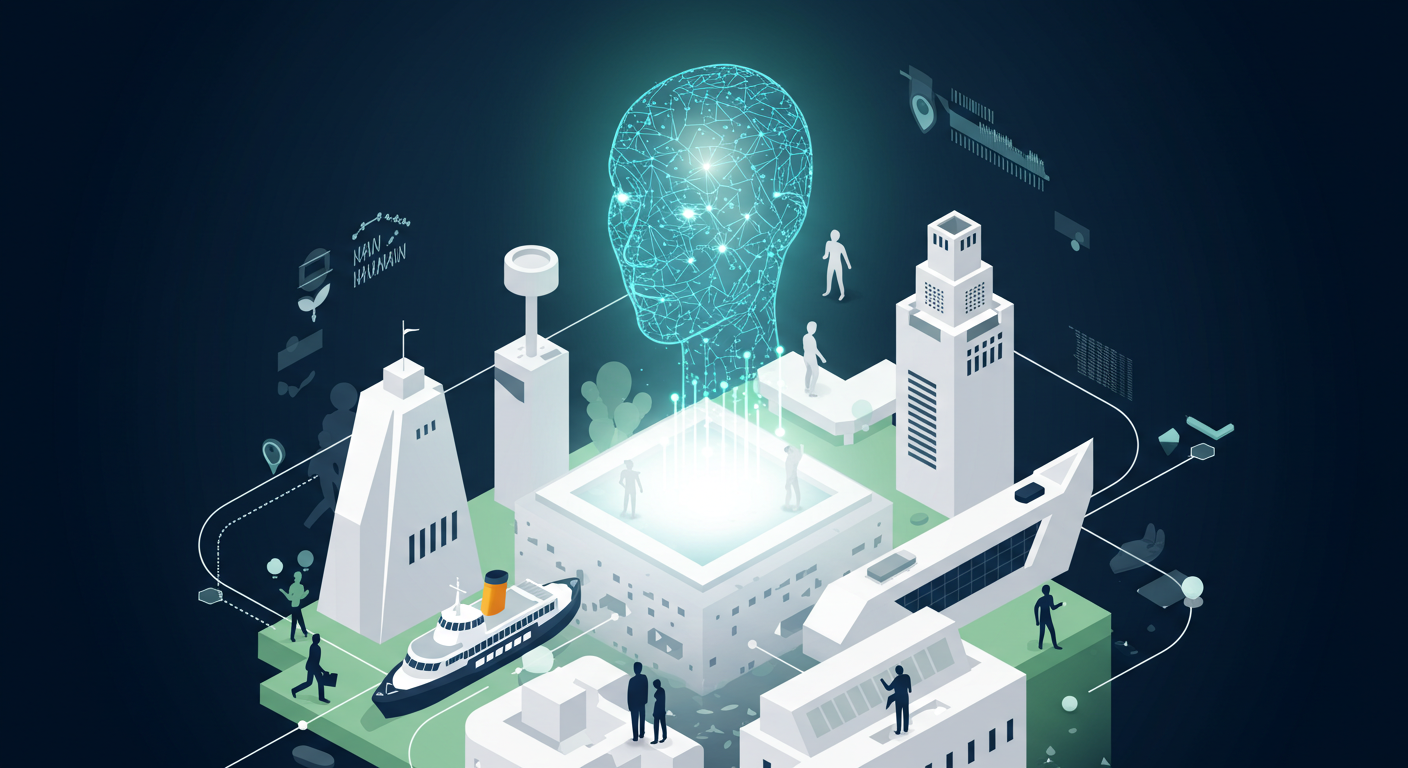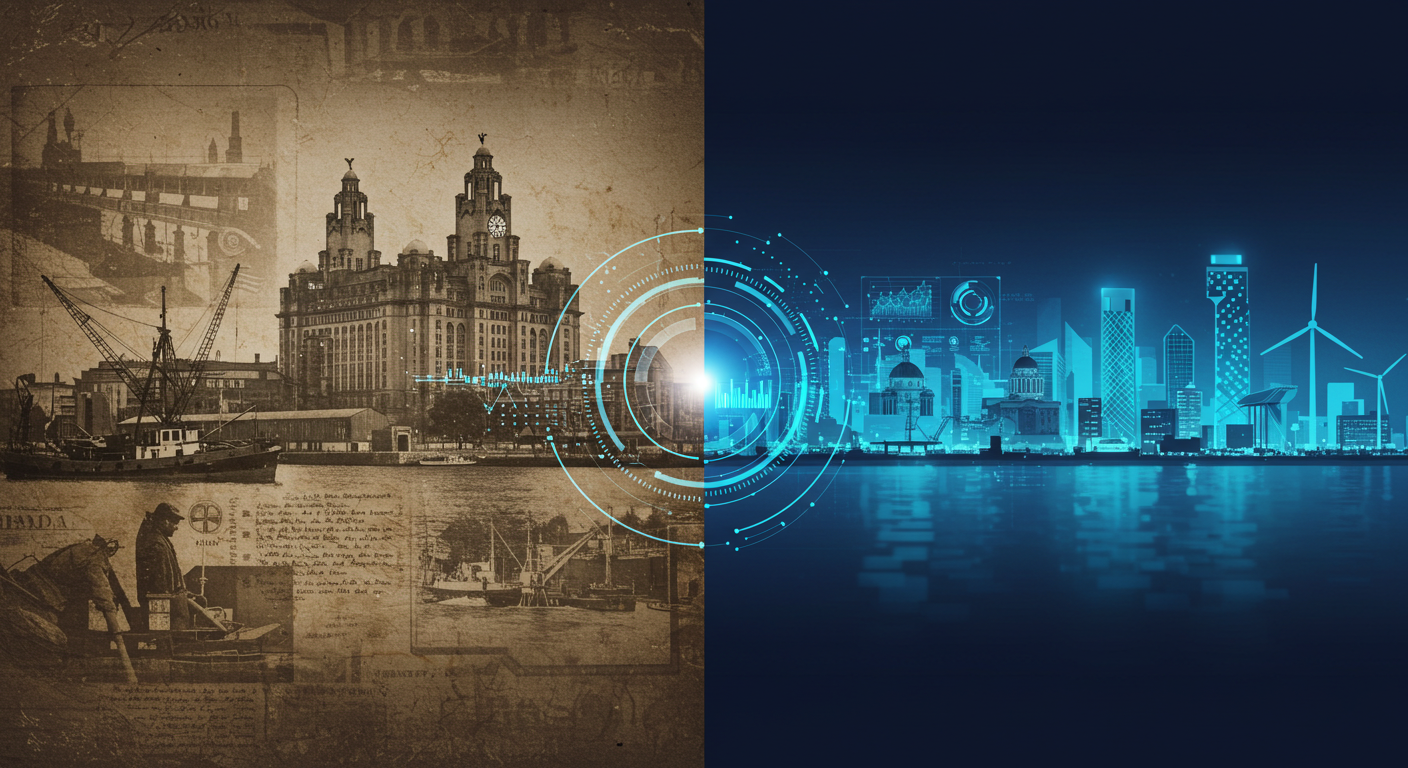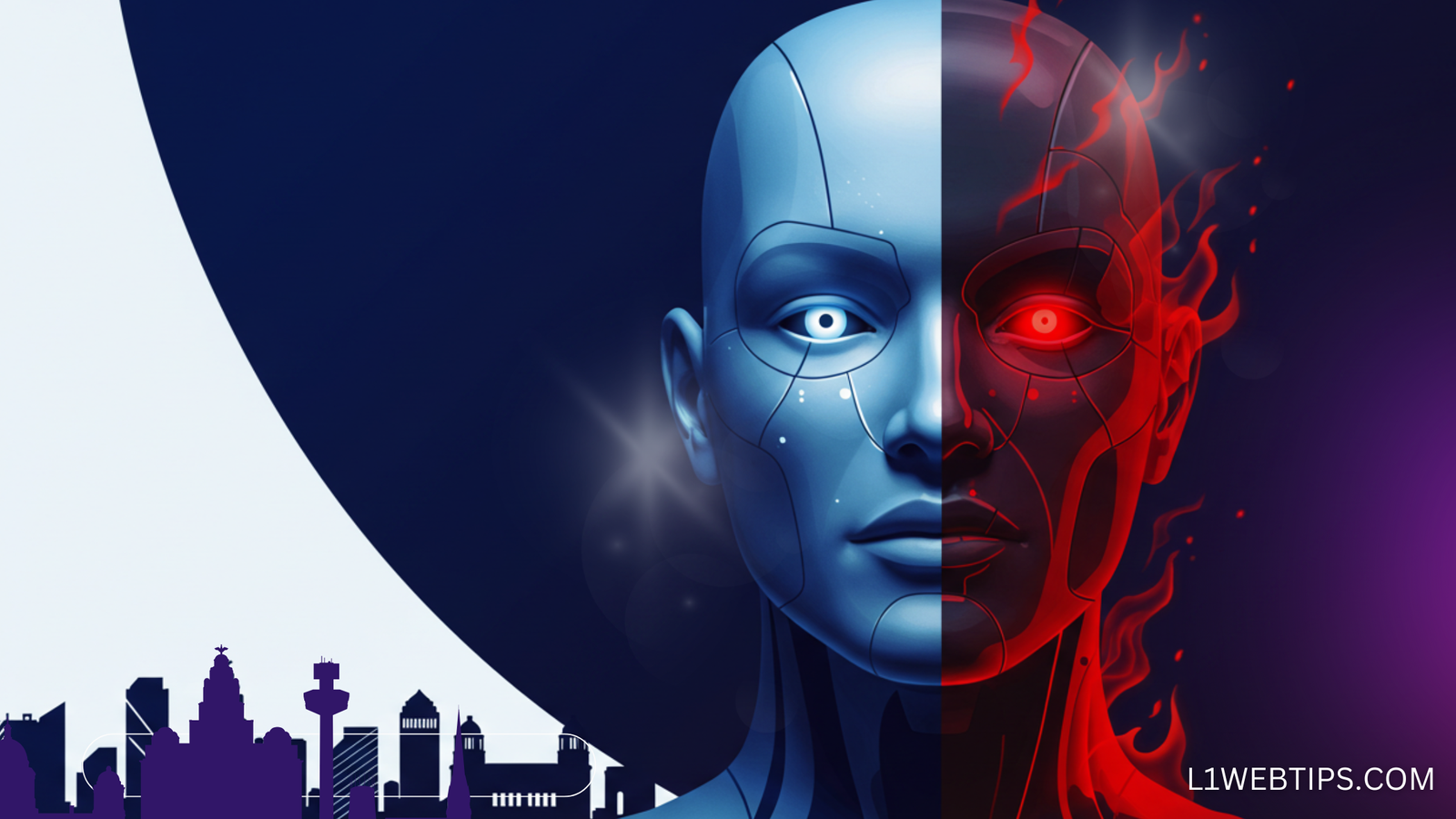AI on the Mersey: How Liverpool Is Powering a Fair Digital Future
A Summit on the Mersey
When the Liverpool City Region AI Summit filled the ACC Liverpool in October 2025, the excitement wasn’t about robots replacing humans. It was about something much more meaningful: how artificial intelligence could help Liverpool solve real, everyday problems — from hospital waiting times to transport bottlenecks to small business survival.
That discussion is backed by the region’s ambitious AI & Data Strategy, which promotes “AI for Good.” The focus? Fairness, inclusion, and making technology work for people — not the other way around.
👉 Liverpool City Region AI Summit | AI & Data Strategy

From Docks to Data
Liverpool has always been a city of reinvention. The same river that once carried ships and goods now carries data and ideas. In that sense, Liverpool AI isn’t a futuristic fantasy — it’s already part of daily life in hospitals, classrooms, and even at the docks.
Where the Industrial Revolution once defined Liverpool’s identity, the digital revolution is now reshaping it — grounded in creativity, collaboration, and community.
Healthcare: Algorithms with a Human Touch
At Alder Hey Children’s Hospital, AI tools are helping surgeons visualise complex operations in real time. Across the city, at the University of Liverpool, machine learning is accelerating drug discovery — cutting research timelines from years to months.
These technologies don’t replace doctors; they extend their expertise, improving speed, accuracy, and patient care. As one consultant put it:
“AI gives us insight — but compassion still has to come from people.”
In Liverpool, the message is clear: technology supports humans, not the other way around.
The Port Economy: Smarter, Faster, Greener
Liverpool’s docks have powered the city’s economy for centuries. Today, AI is steering the next wave of efficiency. Smart sensors and predictive algorithms optimise container flow, forecast weather disruptions, and reduce idle time — saving fuel and cutting emissions.
It’s a digital continuation of the city’s maritime legacy: the same global trade, but faster, greener, and data-driven.
For a city built on shipping, this is evolution — not disruption.
Culture Meets Code
Liverpool’s creative scene isn’t missing the AI beat either. Local studios and musicians are using generative AI to remix archival recordings, design campaigns, and experiment with storytelling.
Still, AI can only go so far.
It can remix a Beatles track, but it can’t capture the humour of a terrace chant or the pride of a Saturday at Anfield. That spark — that soul — remains purely human.
AI may write code, but Liverpool writes character.
Small Businesses, Big Shifts
Across Merseyside, small businesses are quietly adopting AI in practical, no-nonsense ways.
From retail to design to logistics, AI is helping local entrepreneurs streamline tasks, improve customer experiences, and find clarity in data that once felt overwhelming.
But while tools are smarter, the motivation remains the same: to give people more time to do what matters — building relationships, not spreadsheets.
Inside L1WebTips.com: Using AI Without Losing the Human Touch
At L1WebTips.com, we’ve been experimenting with AI for a while — not as a gimmick, but as a practical way to make our work sharper and more efficient.
We use AI to tidy up the unglamorous bits: automating admin, spotting website bugs, and highlighting where designs or pages could perform better. It’s like having an extra pair of eyes that never gets tired of analytics.
AI helps us draft content, test campaign ideas, and translate complex concepts into plain English — a big deal when working with small business owners who just want things to “work.” It’s not about replacing creativity; it’s about freeing us to spend more time thinking, designing, and problem-solving.
We’re honest about what AI can’t do.
It can’t understand brand personality, it can’t sense local humour, and it definitely can’t replicate a proper Scouse tone. That’s still human territory.
The biggest change we’ve seen? Time and focus.
By using AI to handle the routine parts, we’ve been able to deliver cleaner websites, more effective content, and clearer communication. It’s helped reduce burnout while keeping our voice — and our clients’ voices — genuinely human.
In short, AI hasn’t replaced what we do at L1WebTips.com. It’s just helped us do it better, faster, and with more breathing room.
Skills and the Future of Work
The Liverpool City Region Combined Authority has made one thing clear: AI must be fair. That means reskilling workers, embedding AI literacy across industries, and ensuring no community gets left behind.
New training programmes are emerging — from logistics and retail to digital arts — all focused on equipping people with the confidence to thrive in an AI-powered economy.
It’s not just about new jobs; it’s about new ways of working — collaboration between humans and intelligent systems.

A City Shaping Its Own Future
The story of Liverpool AI isn’t about machines replacing people. It’s about partnership.
Algorithms can process data, but they can’t replicate empathy, humour, or creativity. Those are the traits Liverpool has in abundance — and the reason its AI journey feels different from anywhere else.
Just as the Mersey once connected Liverpool to the world, AI now connects it digitally — through innovation, fairness, and imagination.
Liverpool has always been a city that reinvents itself. With AI, it’s simply writing its next chapter — one where technology serves the people, not the other way round.
And if the machines ever do take over, they’ll at least know where to find the best music, football, and banter to keep themselves entertained.
💡 Frequently Asked Questions (FAQs)
1. What is Liverpool’s AI & Data Strategy?
It’s the region’s official plan to use AI for public good — focusing on fairness, inclusion, and sustainable innovation.
2. Which Liverpool organisations are leading in AI?
Key players include Alder Hey Children’s Hospital, the University of Liverpool, and the Liverpool City Region Combined Authority.
3. How is AI improving healthcare in Liverpool?
AI is helping with surgical planning, diagnostics, and drug discovery — enhancing care while keeping human expertise at the core.
4. What role does the port play in Liverpool AI adoption?
AI optimises shipping logistics, predicts weather impacts, and reduces carbon emissions — making the port smarter and greener.
5. Are small businesses in Liverpool using AI?
Yes — many, including L1WebTips.com, are using AI to improve content, workflows, and communication without losing their human touch.
6. How can Liverpool residents get AI-ready?
Through reskilling initiatives by local universities and the Combined Authority, aimed at building AI literacy and digital confidence.
Conclusion: Smart Tech, Scouse Spirit
Liverpool’s relationship with AI is authentic, grounded, and human. It’s about using technology to enhance life, not replace it.
From the docks to data labs — and from L1WebTips.com to Alder Hey — this is Liverpool’s next act of reinvention: a blend of fairness, creativity, and community that proves technology can have soul.
If the Mersey once powered the world with ships, it’s now doing it again — only this time, with data.




